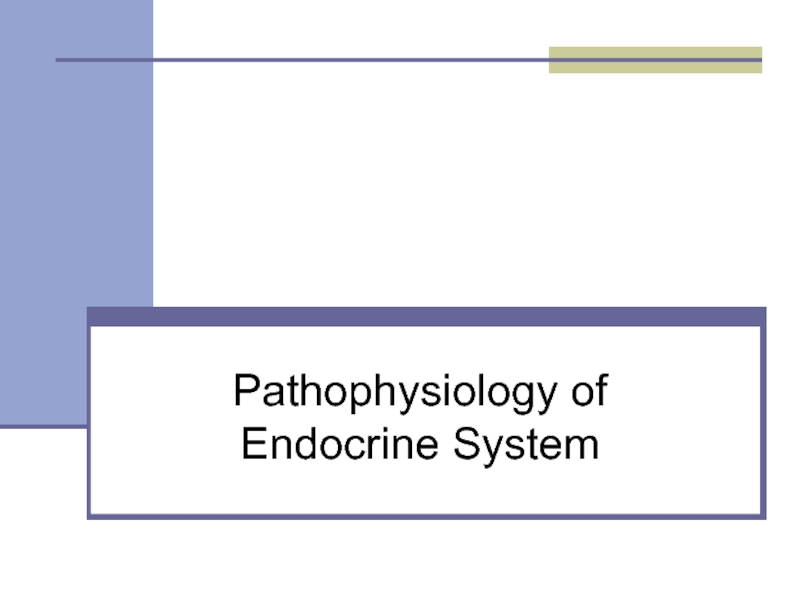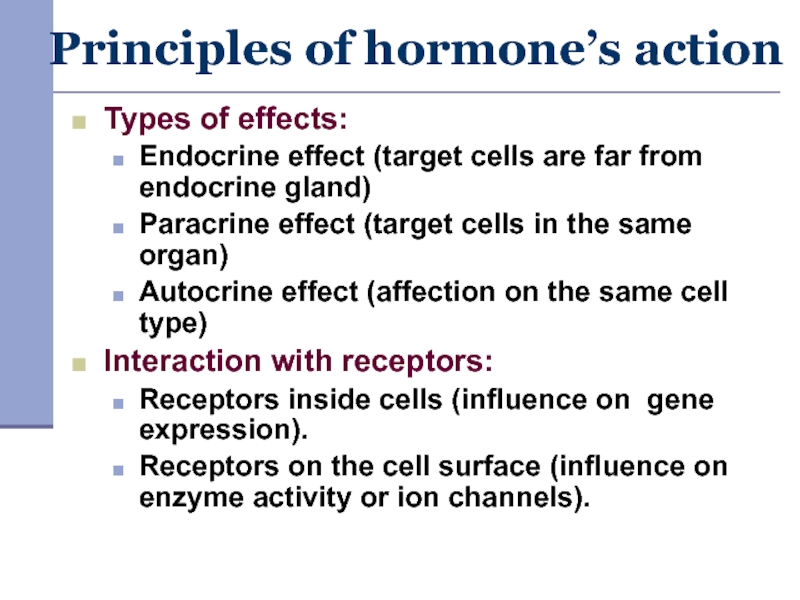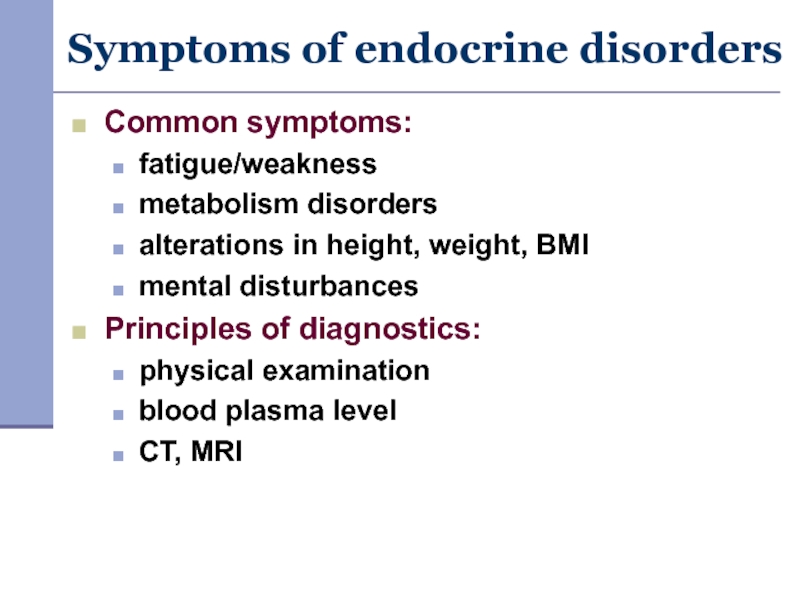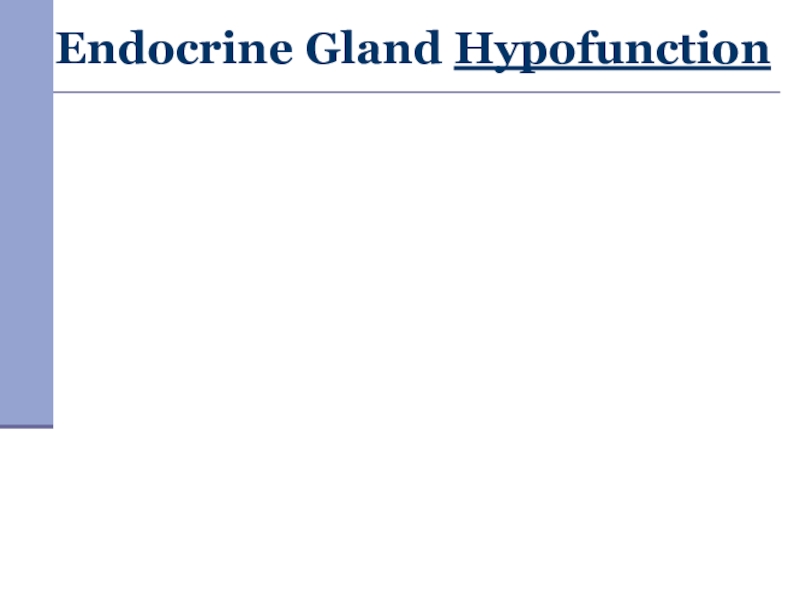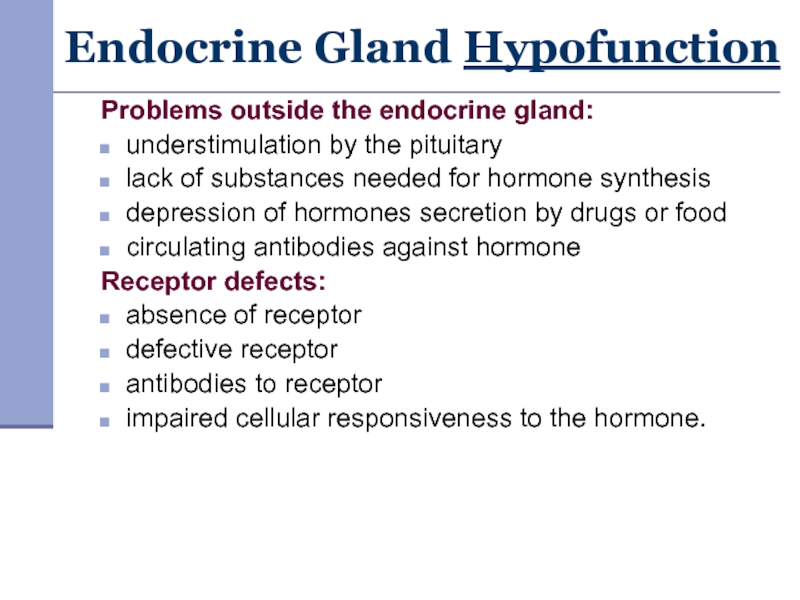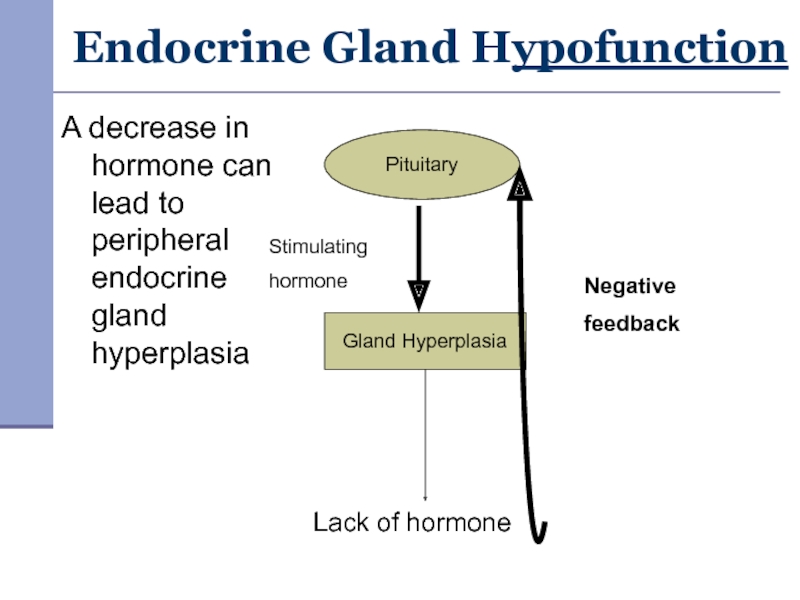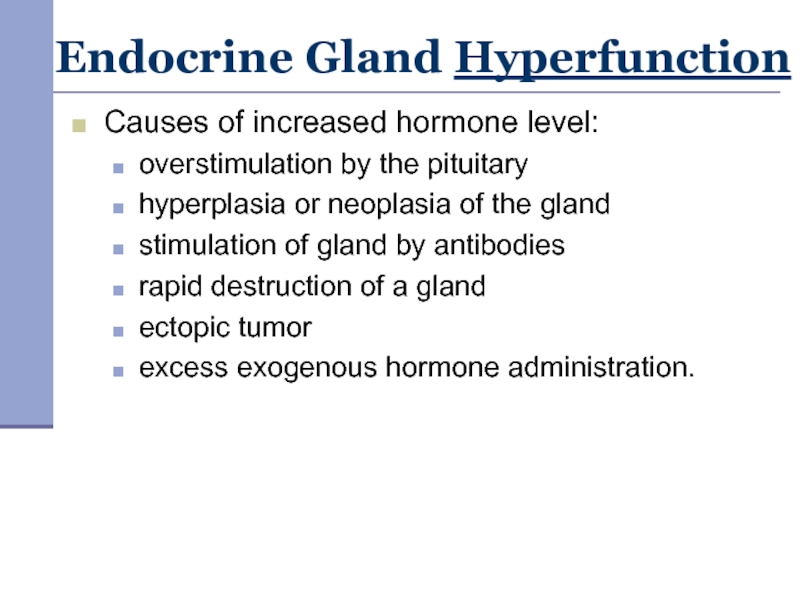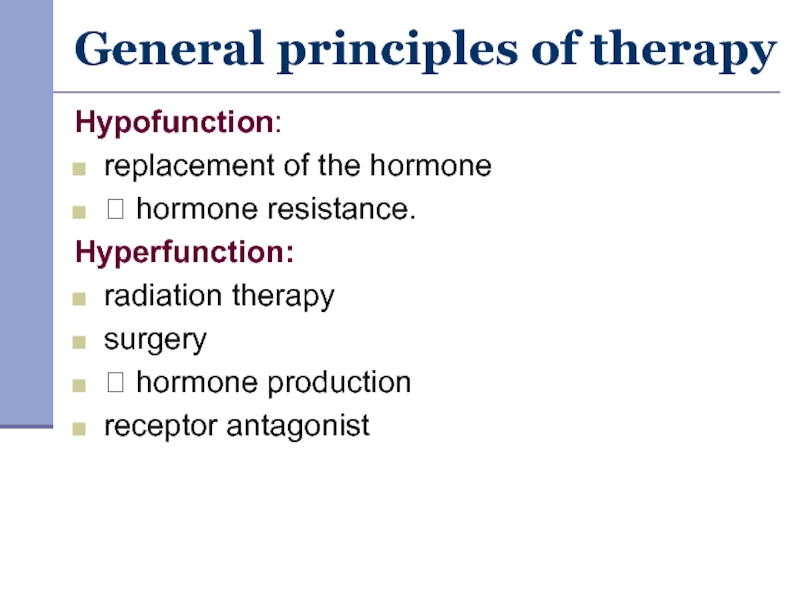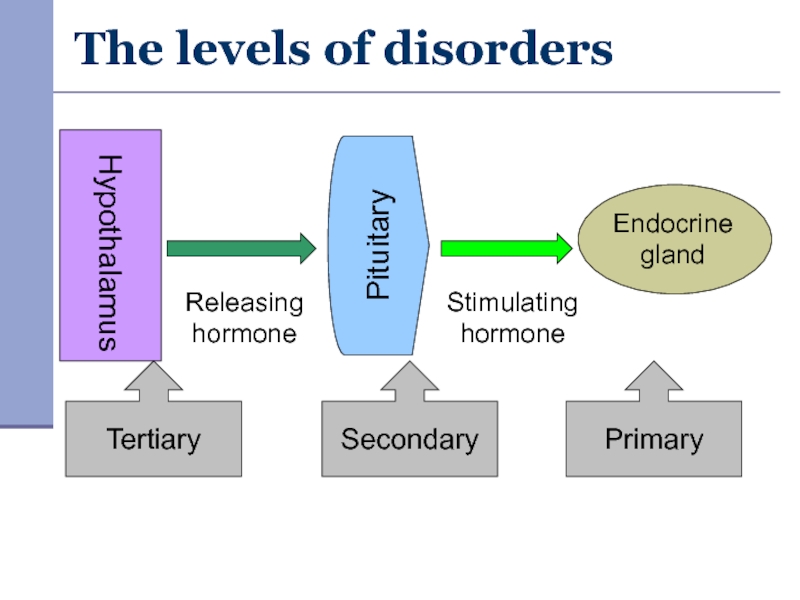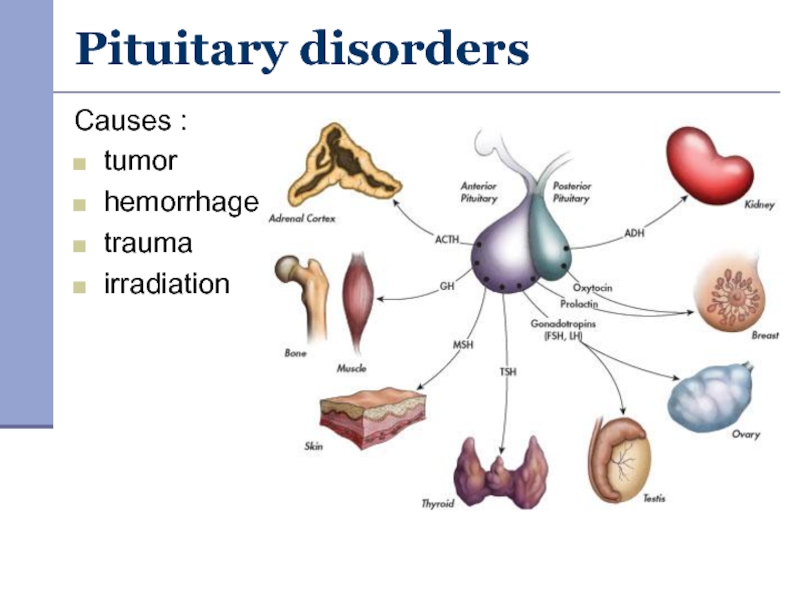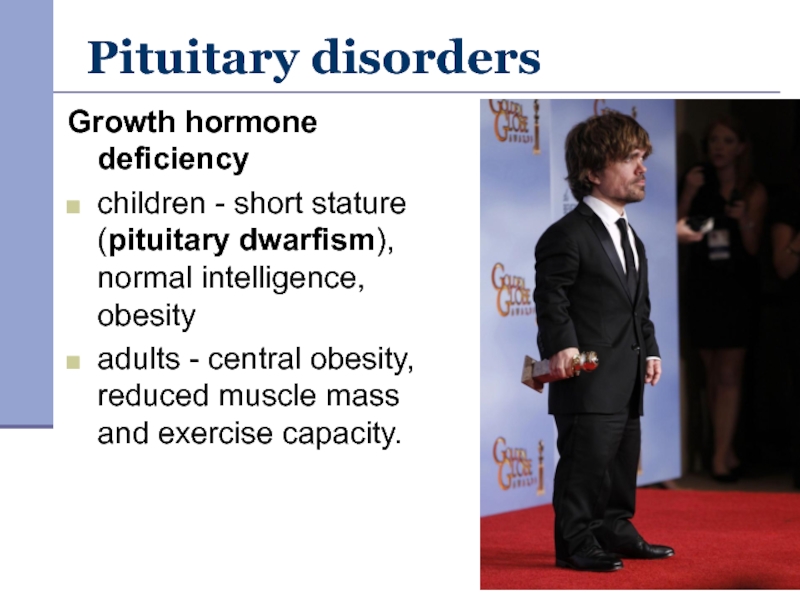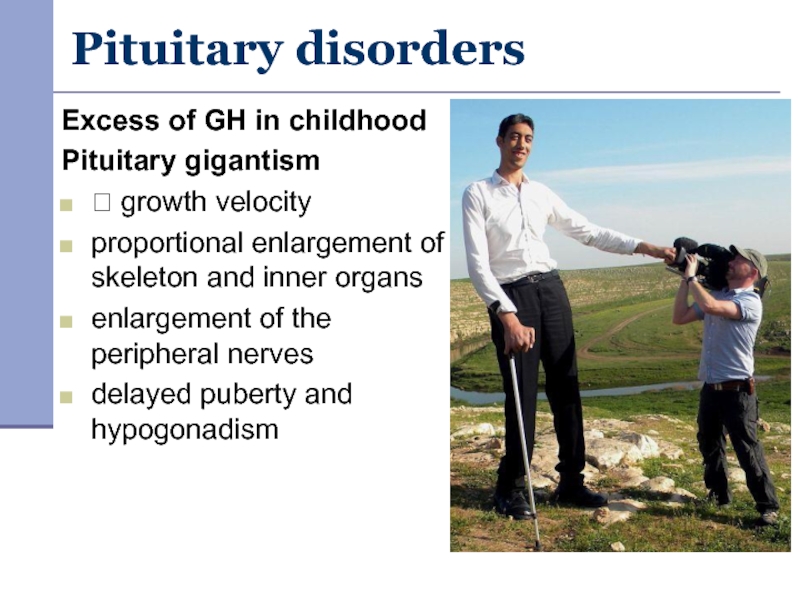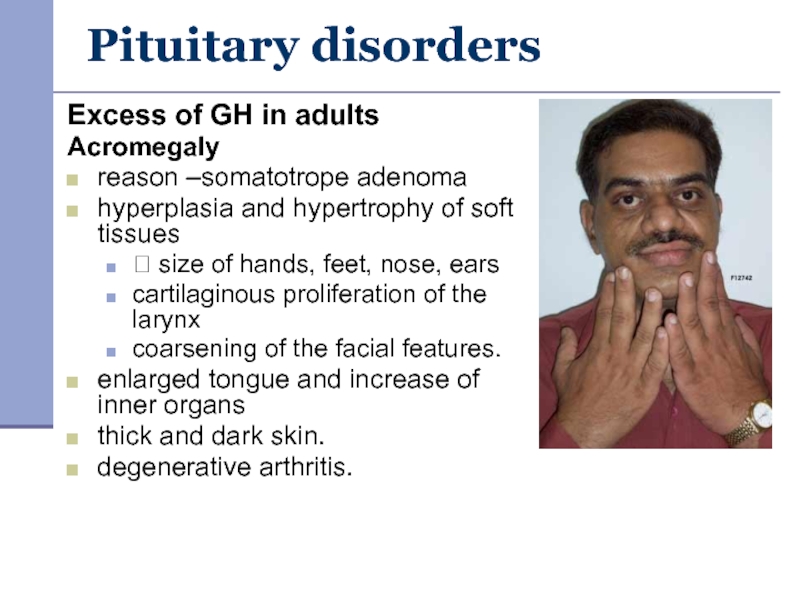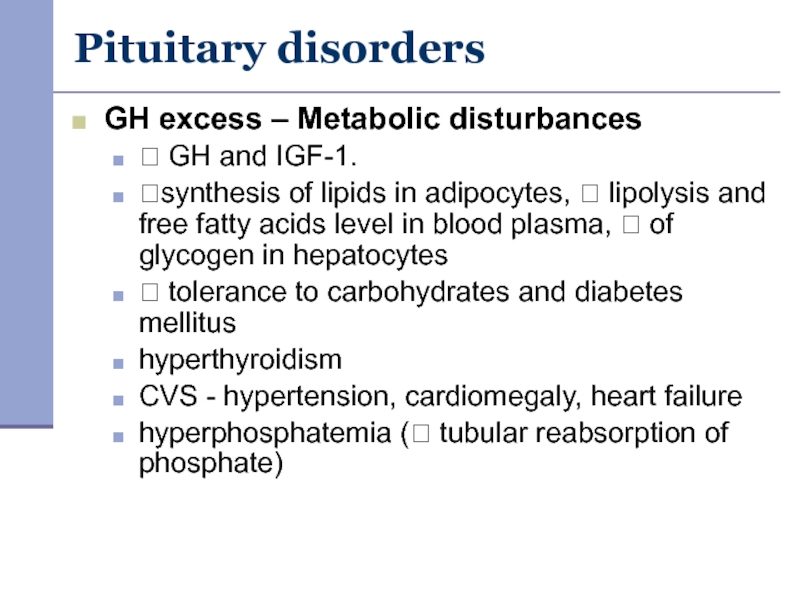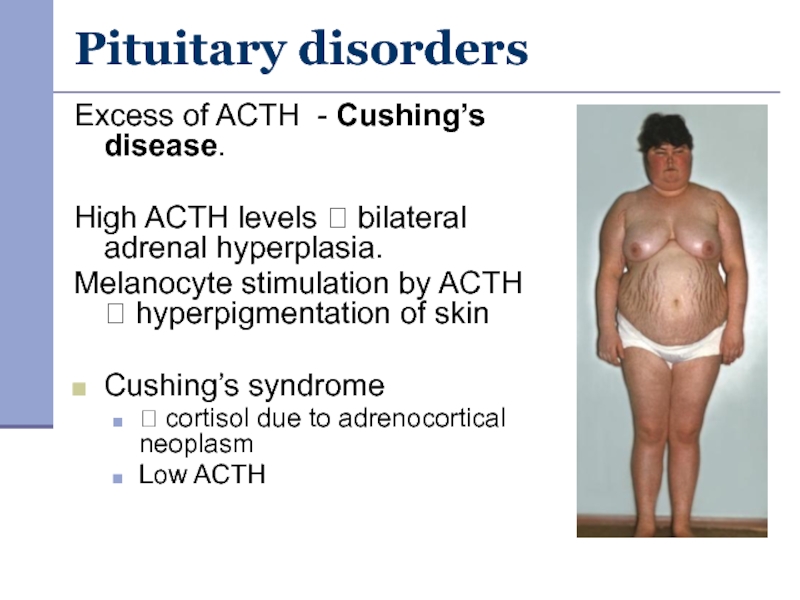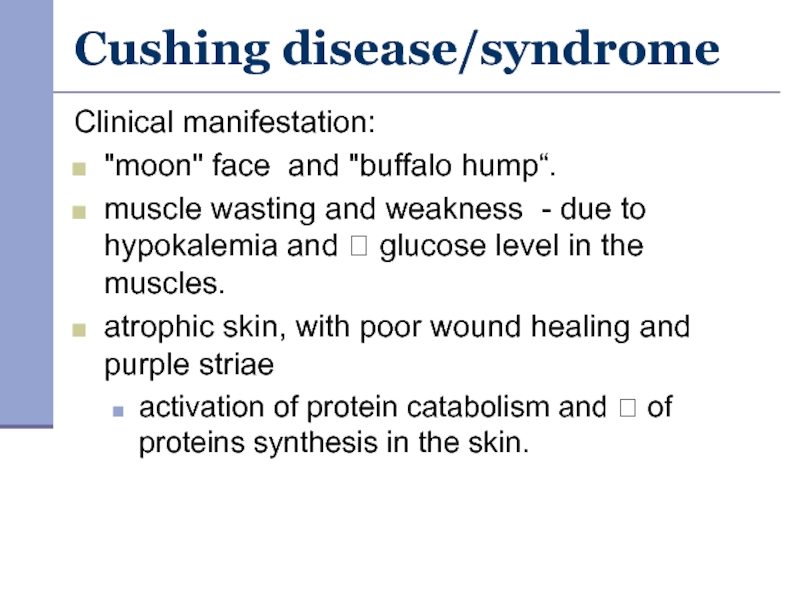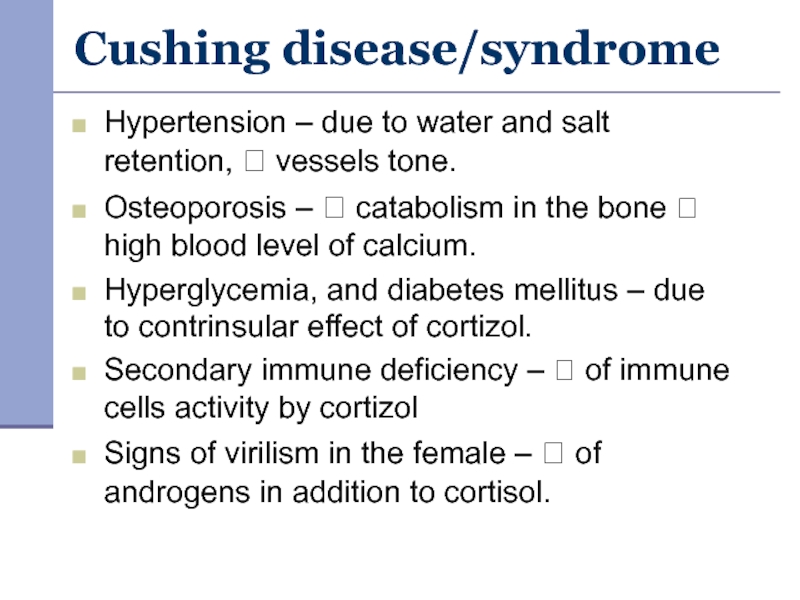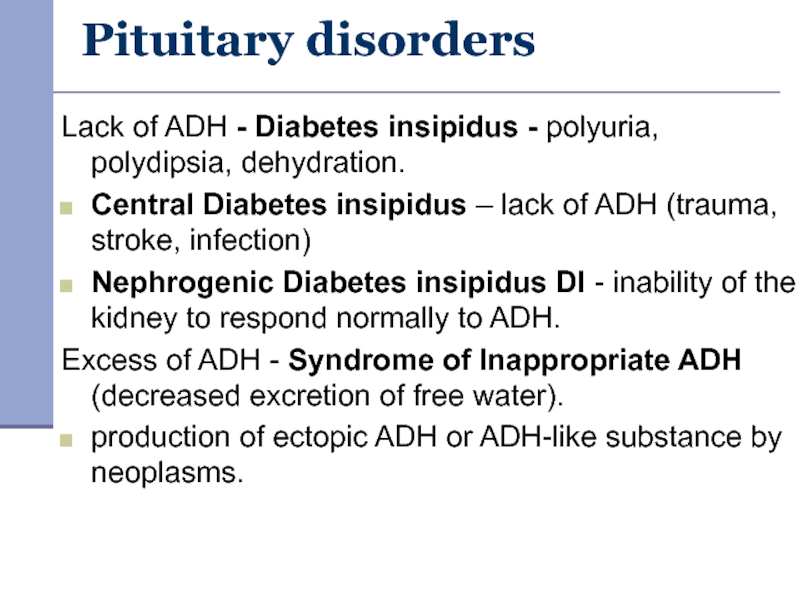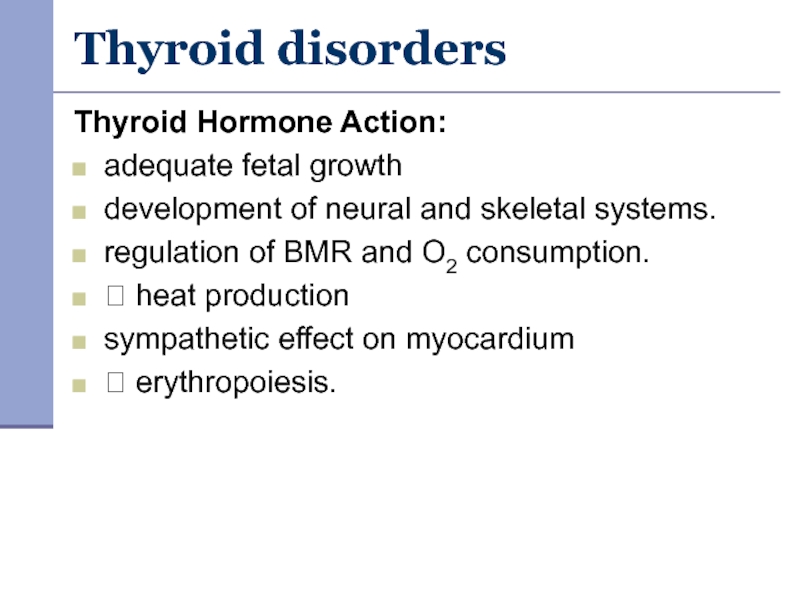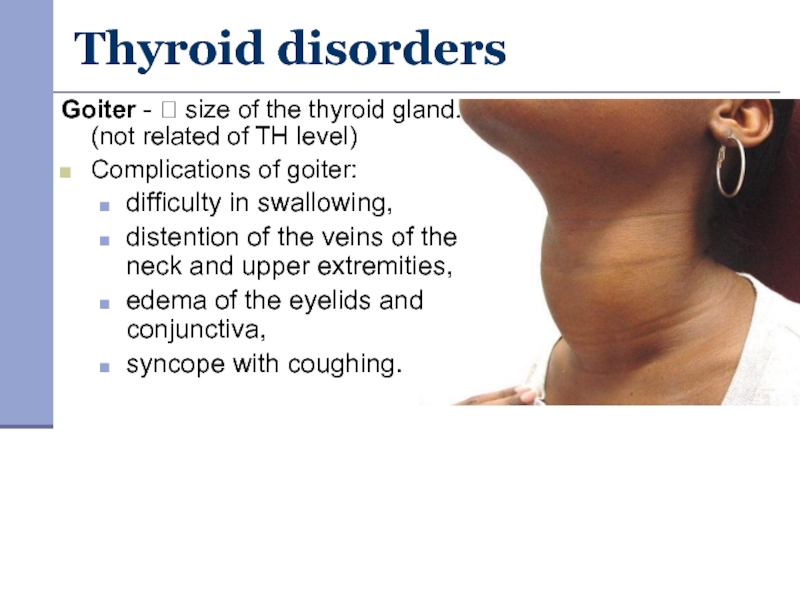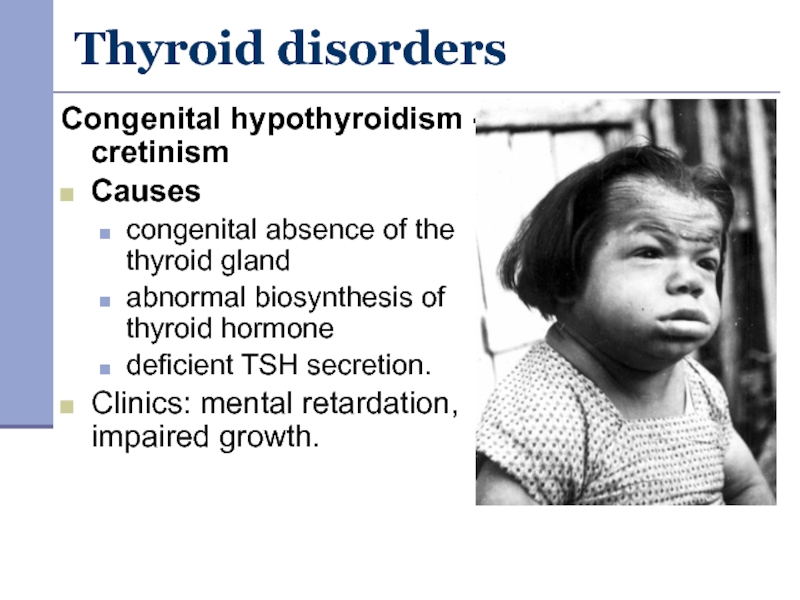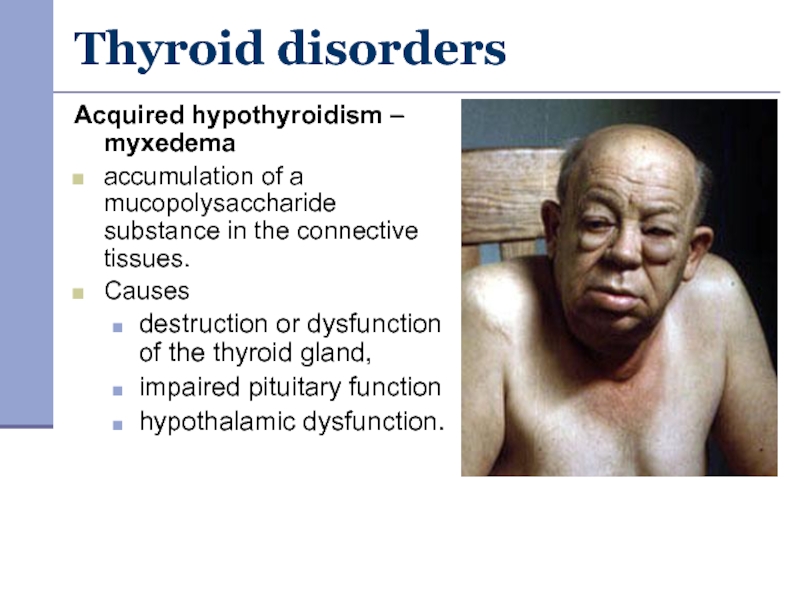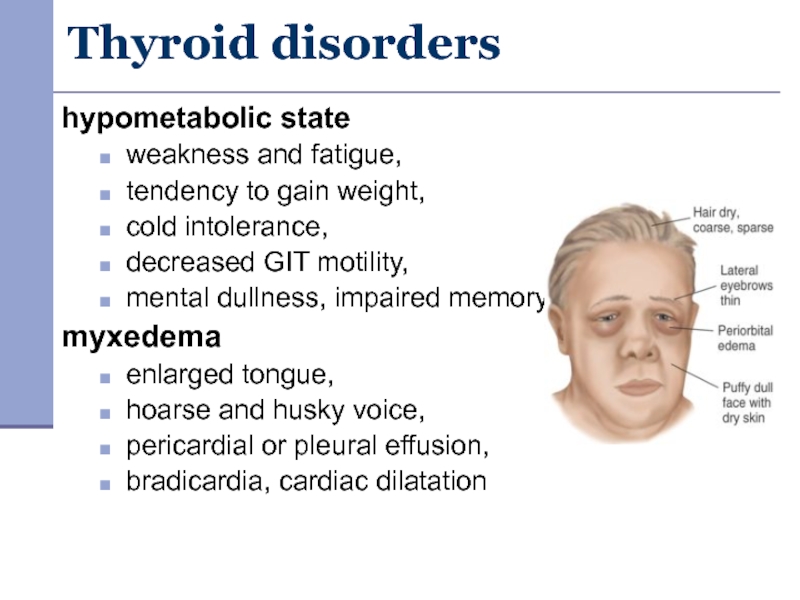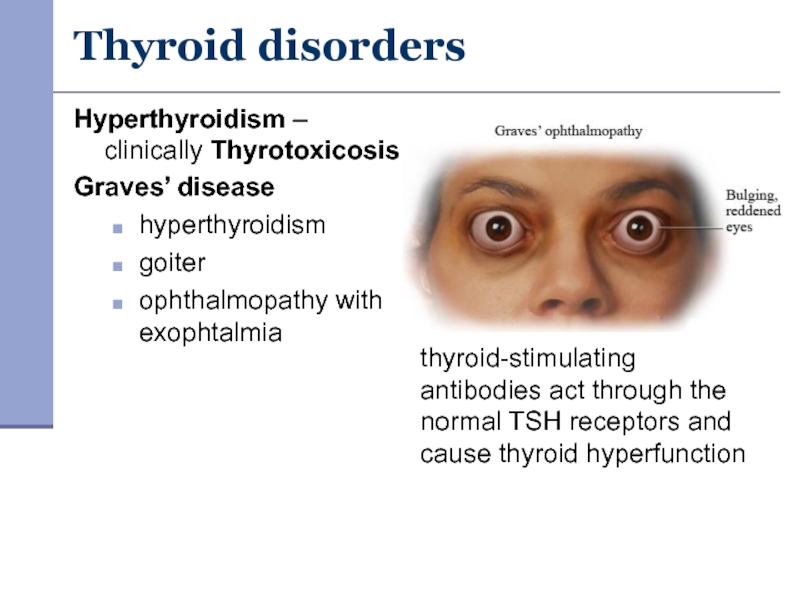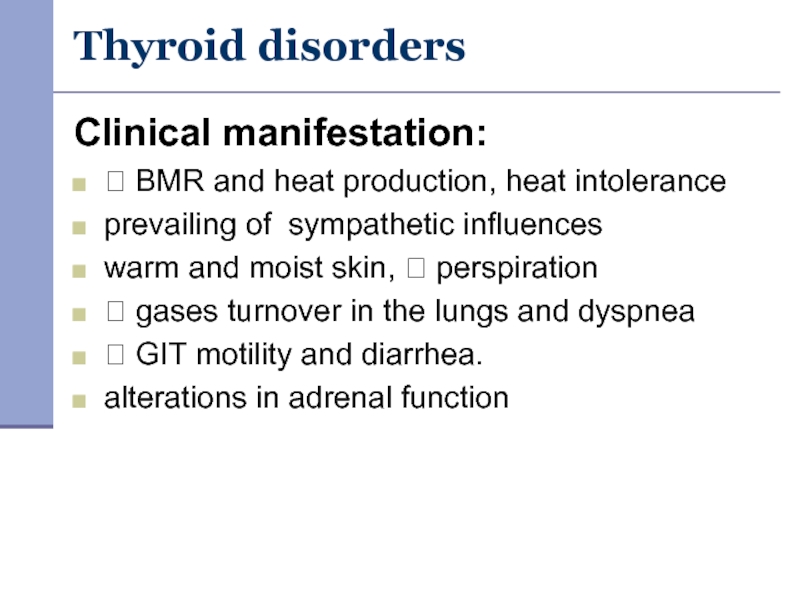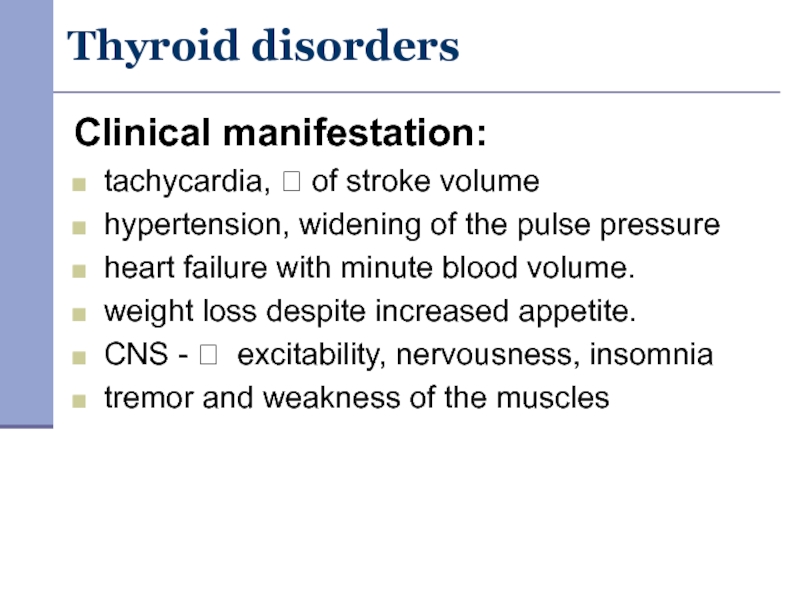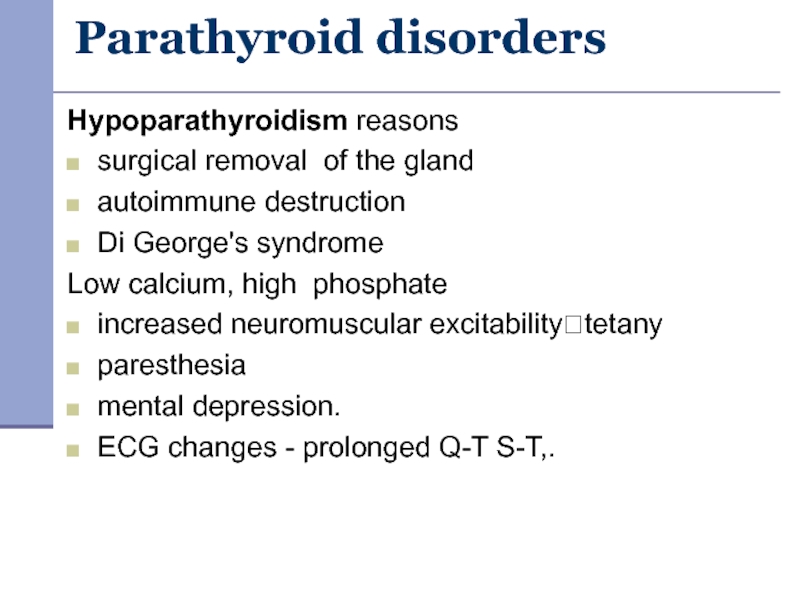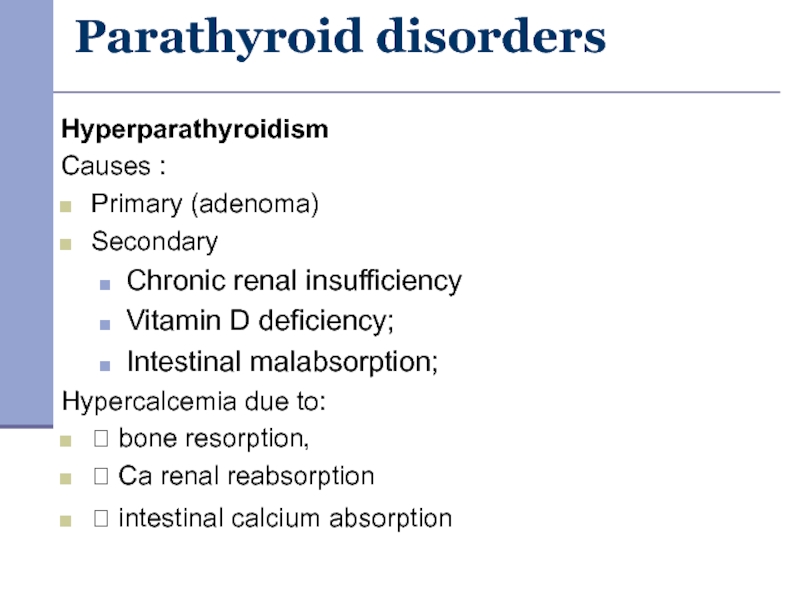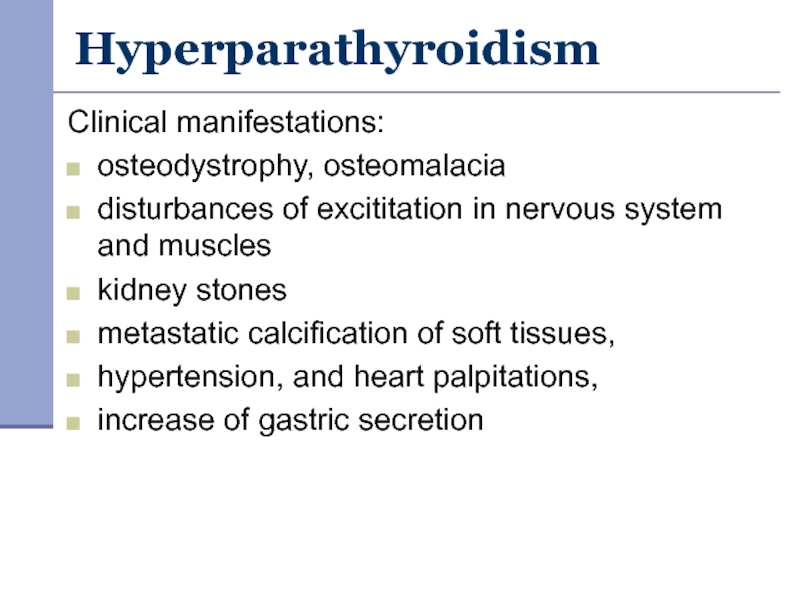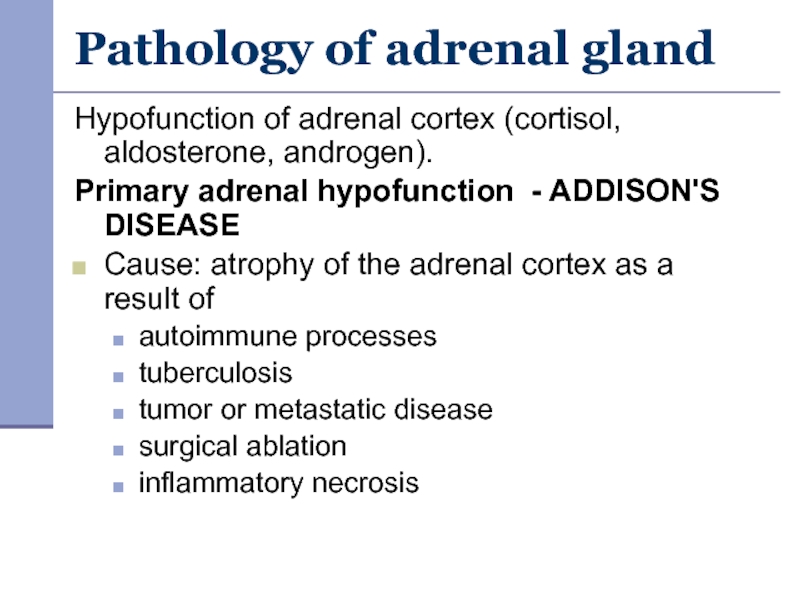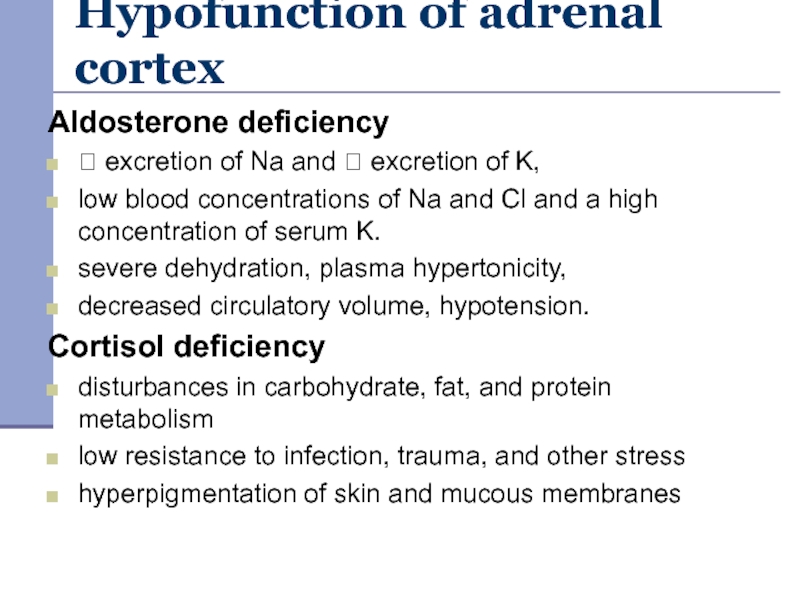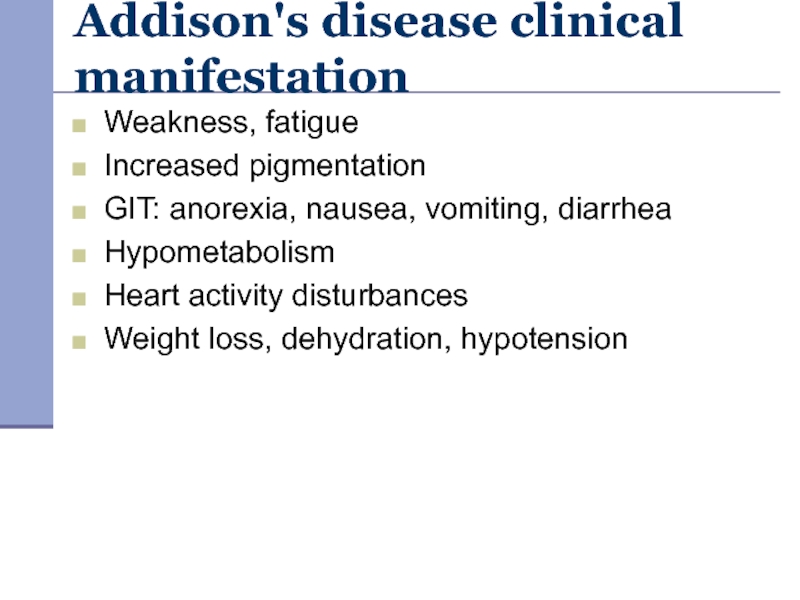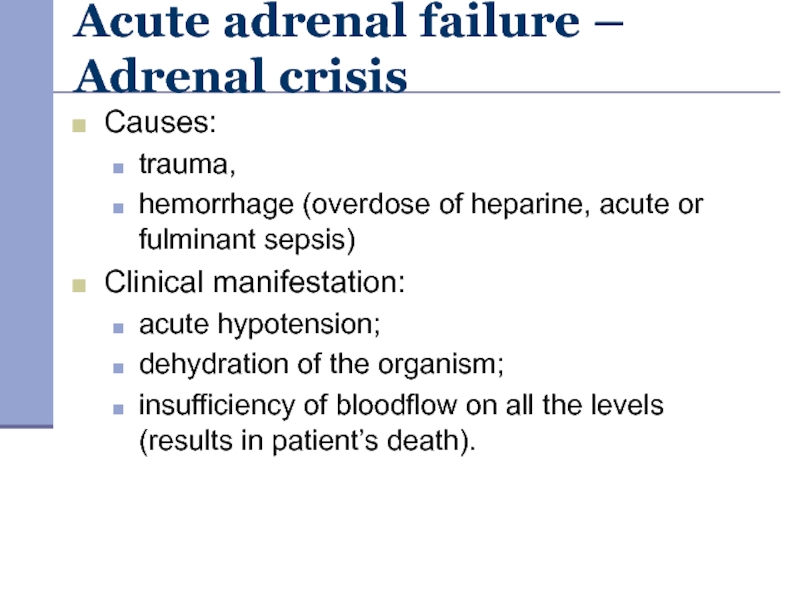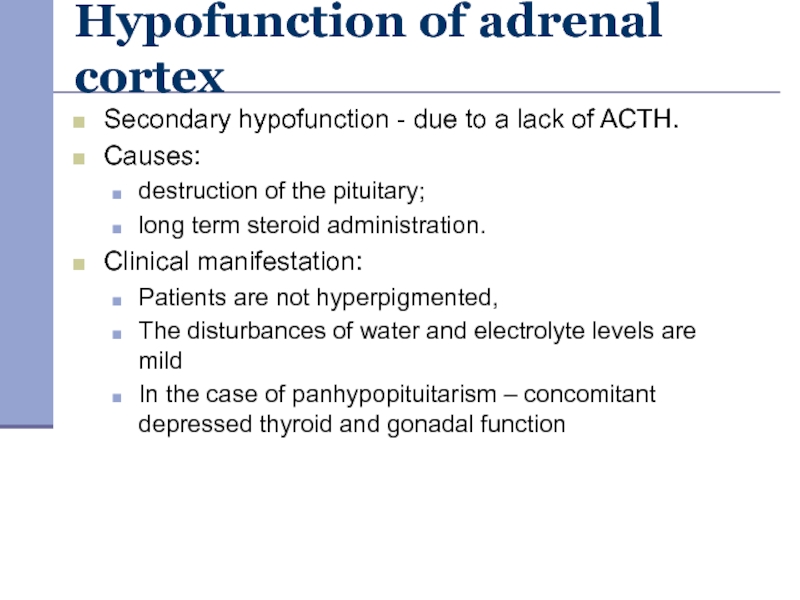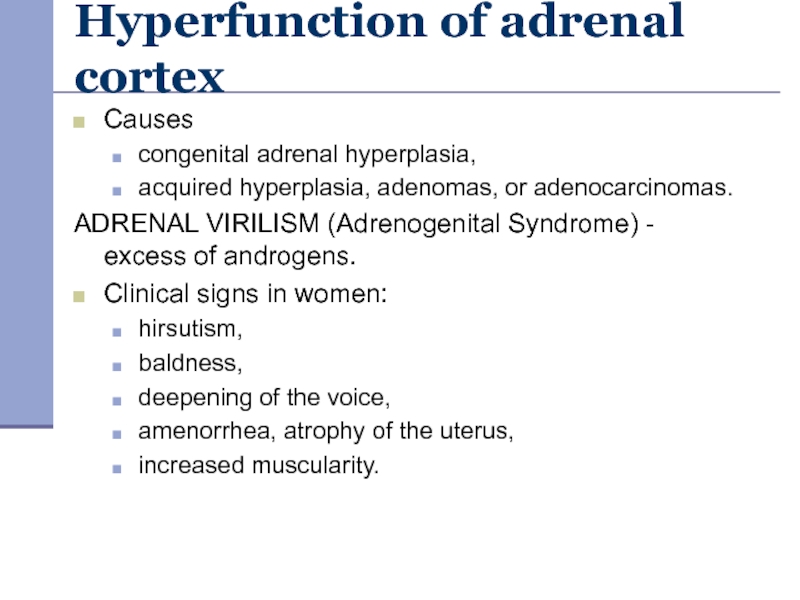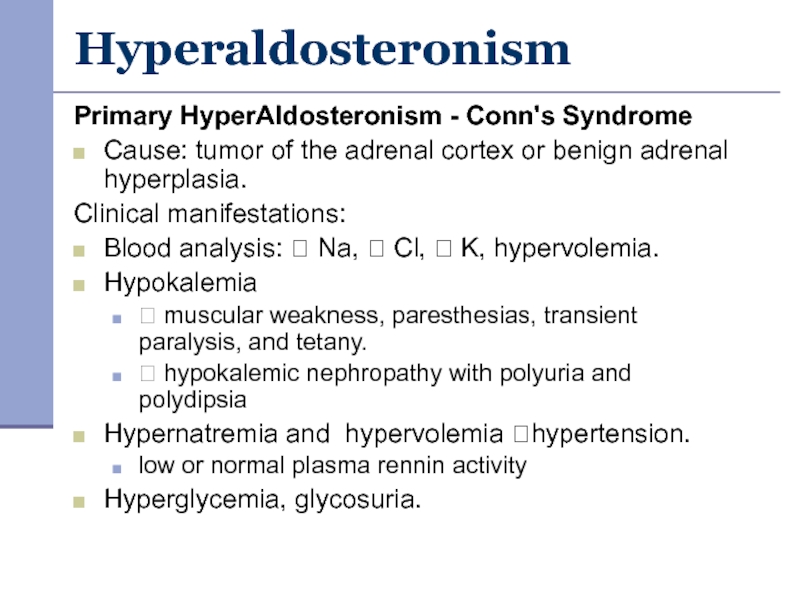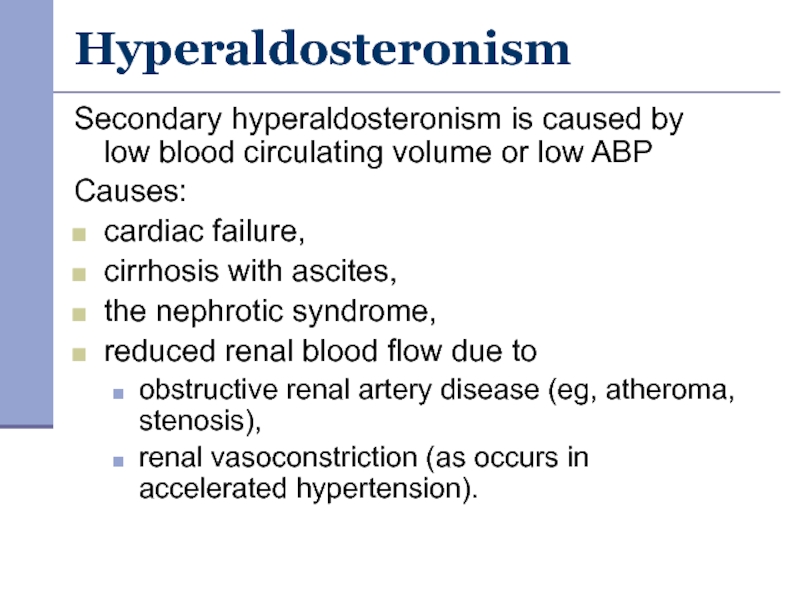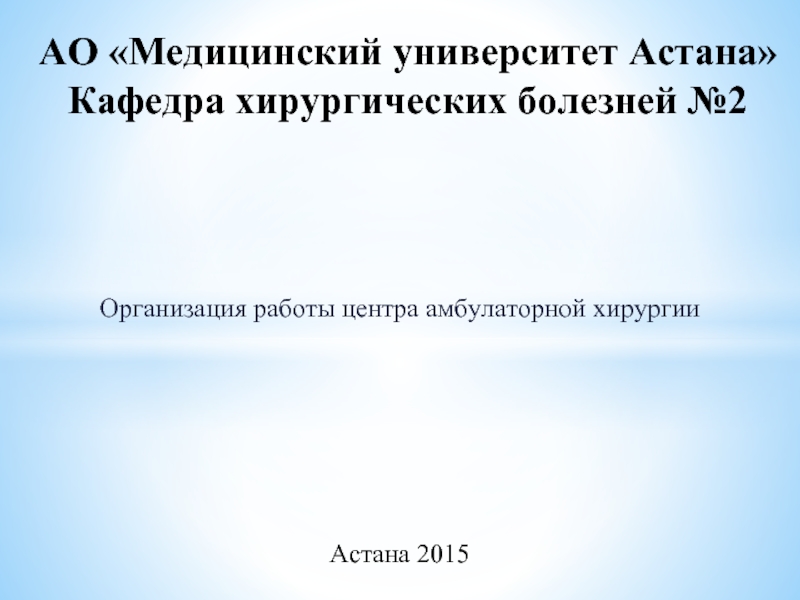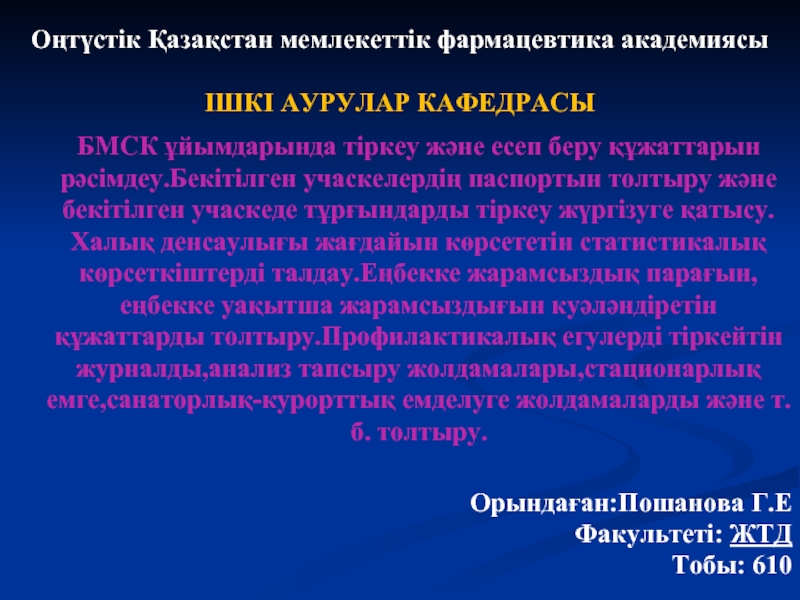- Главная
- Разное
- Дизайн
- Бизнес и предпринимательство
- Аналитика
- Образование
- Развлечения
- Красота и здоровье
- Финансы
- Государство
- Путешествия
- Спорт
- Недвижимость
- Армия
- Графика
- Культурология
- Еда и кулинария
- Лингвистика
- Английский язык
- Астрономия
- Алгебра
- Биология
- География
- Детские презентации
- Информатика
- История
- Литература
- Маркетинг
- Математика
- Медицина
- Менеджмент
- Музыка
- МХК
- Немецкий язык
- ОБЖ
- Обществознание
- Окружающий мир
- Педагогика
- Русский язык
- Технология
- Физика
- Философия
- Химия
- Шаблоны, картинки для презентаций
- Экология
- Экономика
- Юриспруденция
Pathophysiology of endocrine system. (Subject 18) презентация
Содержание
- 1. Pathophysiology of endocrine system. (Subject 18)
- 2. Principles of hormone’s action Types of effects:
- 3. Symptoms of endocrine disorders Common symptoms: fatigue/weakness
- 4. Endocrine Gland Hypofunction
- 5. Endocrine Gland Hypofunction Problems outside the endocrine
- 6. Endocrine Gland Hypofunction A decrease in hormone
- 7. Endocrine Gland Hyperfunction Causes of increased hormone
- 8. General principles of therapy Hypofunction: replacement of
- 9. The levels of disorders
- 10. Pituitary disorders Causes : tumor hemorrhage trauma irradiation
- 11. Pituitary disorders Growth hormone deficiency children
- 12. Pituitary disorders Excess of GH in childhood
- 13. Pituitary disorders Excess of GH in adults
- 14. Pituitary disorders GH excess – Metabolic disturbances
- 15. Pituitary disorders Excess of ACTH - Cushing’s
- 16. Cushing disease/syndrome Clinical manifestation: "moon" face and
- 17. Cushing disease/syndrome Hypertension – due to water
- 18. Pituitary disorders Lack of ADH - Diabetes
- 19. Thyroid disorders Thyroid Hormone Action: adequate fetal
- 20. Thyroid disorders Goiter - ? size of
- 21. Thyroid disorders Congenital hypothyroidism - cretinism Causes
- 22. Thyroid disorders Acquired hypothyroidism – myxedema
- 23. Thyroid disorders hypometabolic state weakness
- 24. Thyroid disorders Hyperthyroidism – clinically Thyrotoxicosis
- 25. Thyroid disorders Clinical manifestation: ? BMR
- 26. Thyroid disorders Clinical manifestation: tachycardia, ?
- 27. Parathyroid disorders Hypoparathyroidism reasons surgical removal of
- 28. Parathyroid disorders Hyperparathyroidism Causes : Primary (adenoma)
- 29. Hyperparathyroidism Clinical manifestations: osteodystrophy, osteomalacia disturbances of
- 30. Pathology of adrenal gland Hypofunction of
- 31. Hypofunction of adrenal cortex Aldosterone deficiency ?
- 32. Addison's disease clinical manifestation Weakness, fatigue Increased
- 33. Acute adrenal failure – Adrenal crisis Causes:
- 34. Hypofunction of adrenal cortex Secondary hypofunction -
- 35. Hyperfunction of adrenal cortex Causes congenital adrenal
- 36. Hyperaldosteronism Primary HyperAldosteronism - Conn's Syndrome
- 37. Hyperaldosteronism Secondary hyperaldosteronism is caused by low
Слайд 2Principles of hormone’s action
Types of effects:
Endocrine effect (target cells are far
from endocrine gland)
Paracrine effect (target cells in the same organ)
Autocrine effect (affection on the same cell type)
Interaction with receptors:
Receptors inside cells (influence on gene expression).
Receptors on the cell surface (influence on enzyme activity or ion channels).
Paracrine effect (target cells in the same organ)
Autocrine effect (affection on the same cell type)
Interaction with receptors:
Receptors inside cells (influence on gene expression).
Receptors on the cell surface (influence on enzyme activity or ion channels).
Слайд 3Symptoms of endocrine disorders
Common symptoms:
fatigue/weakness
metabolism disorders
alterations in height, weight, BMI
mental disturbances
Principles
of diagnostics:
physical examination
blood plasma level
CT, MRI
physical examination
blood plasma level
CT, MRI
Слайд 5Endocrine Gland Hypofunction
Problems outside the endocrine gland:
understimulation by the pituitary
lack
of substances needed for hormone synthesis
depression of hormones secretion by drugs or food
circulating antibodies against hormone
Receptor defects:
absence of receptor
defective receptor
antibodies to receptor
impaired cellular responsiveness to the hormone.
depression of hormones secretion by drugs or food
circulating antibodies against hormone
Receptor defects:
absence of receptor
defective receptor
antibodies to receptor
impaired cellular responsiveness to the hormone.
Слайд 6Endocrine Gland Hypofunction
A decrease in hormone can lead to peripheral endocrine
gland hyperplasia
Pituitary
Gland Hyperplasia
Lack of hormone
Stimulating
hormone
Negative
feedback
Слайд 7Endocrine Gland Hyperfunction
Causes of increased hormone level:
overstimulation by the pituitary
hyperplasia or
neoplasia of the gland
stimulation of gland by antibodies
rapid destruction of a gland
ectopic tumor
excess exogenous hormone administration.
stimulation of gland by antibodies
rapid destruction of a gland
ectopic tumor
excess exogenous hormone administration.
Слайд 8General principles of therapy
Hypofunction:
replacement of the hormone
? hormone resistance.
Hyperfunction:
radiation therapy
surgery
? hormone production
receptor antagonist
Слайд 11Pituitary disorders
Growth hormone deficiency
children - short stature (pituitary dwarfism), normal
intelligence, obesity
adults - central obesity, reduced muscle mass and exercise capacity.
adults - central obesity, reduced muscle mass and exercise capacity.
Слайд 12Pituitary disorders
Excess of GH in childhood
Pituitary gigantism
? growth velocity
proportional enlargement
of skeleton and inner organs
enlargement of the peripheral nerves
delayed puberty and hypogonadism
enlargement of the peripheral nerves
delayed puberty and hypogonadism
Слайд 13Pituitary disorders
Excess of GH in adults
Acromegaly
reason –somatotrope adenoma
hyperplasia and
hypertrophy of soft tissues
? size of hands, feet, nose, ears
cartilaginous proliferation of the larynx
coarsening of the facial features.
enlarged tongue and increase of inner organs
thick and dark skin.
degenerative arthritis.
? size of hands, feet, nose, ears
cartilaginous proliferation of the larynx
coarsening of the facial features.
enlarged tongue and increase of inner organs
thick and dark skin.
degenerative arthritis.
Слайд 14Pituitary disorders
GH excess – Metabolic disturbances
? GH and IGF-1.
?synthesis of lipids
in adipocytes, ? lipolysis and free fatty acids level in blood plasma, ? of glycogen in hepatocytes
? tolerance to carbohydrates and diabetes mellitus
hyperthyroidism
CVS - hypertension, cardiomegaly, heart failure
hyperphosphatemia (? tubular reabsorption of phosphate)
? tolerance to carbohydrates and diabetes mellitus
hyperthyroidism
CVS - hypertension, cardiomegaly, heart failure
hyperphosphatemia (? tubular reabsorption of phosphate)
Слайд 15Pituitary disorders
Excess of ACTH - Cushing’s disease.
High ACTH levels ?
bilateral adrenal hyperplasia.
Melanocyte stimulation by ACTH ? hyperpigmentation of skin
Cushing’s syndrome
? cortisol due to adrenocortical neoplasm
Low ACTH
Melanocyte stimulation by ACTH ? hyperpigmentation of skin
Cushing’s syndrome
? cortisol due to adrenocortical neoplasm
Low ACTH
Слайд 16Cushing disease/syndrome
Clinical manifestation:
"moon" face and "buffalo hump“.
muscle wasting and weakness
- due to hypokalemia and ? glucose level in the muscles.
atrophic skin, with poor wound healing and purple striae
activation of protein catabolism and ? of proteins synthesis in the skin.
atrophic skin, with poor wound healing and purple striae
activation of protein catabolism and ? of proteins synthesis in the skin.
Слайд 17Cushing disease/syndrome
Hypertension – due to water and salt retention, ? vessels
tone.
Osteoporosis – ? catabolism in the bone ? high blood level of calcium.
Hyperglycemia, and diabetes mellitus – due to contrinsular effect of cortizol.
Secondary immune deficiency – ? of immune cells activity by cortizol
Signs of virilism in the female – ? of androgens in addition to cortisol.
Osteoporosis – ? catabolism in the bone ? high blood level of calcium.
Hyperglycemia, and diabetes mellitus – due to contrinsular effect of cortizol.
Secondary immune deficiency – ? of immune cells activity by cortizol
Signs of virilism in the female – ? of androgens in addition to cortisol.
Слайд 18Pituitary disorders
Lack of ADH - Diabetes insipidus - polyuria, polydipsia, dehydration.
Central
Diabetes insipidus – lack of ADH (trauma, stroke, infection)
Nephrogenic Diabetes insipidus DI - inability of the kidney to respond normally to ADH.
Excess of ADH - Syndrome of Inappropriate ADH (decreased excretion of free water).
production of ectopic ADH or ADH-like substance by neoplasms.
Nephrogenic Diabetes insipidus DI - inability of the kidney to respond normally to ADH.
Excess of ADH - Syndrome of Inappropriate ADH (decreased excretion of free water).
production of ectopic ADH or ADH-like substance by neoplasms.
Слайд 19Thyroid disorders
Thyroid Hormone Action:
adequate fetal growth
development of neural and skeletal
systems.
regulation of BMR and O2 consumption.
? heat production
sympathetic effect on myocardium
? erythropoiesis.
regulation of BMR and O2 consumption.
? heat production
sympathetic effect on myocardium
? erythropoiesis.
Слайд 20Thyroid disorders
Goiter - ? size of the thyroid gland. (not related
of TH level)
Complications of goiter:
difficulty in swallowing,
distention of the veins of the neck and upper extremities,
edema of the eyelids and conjunctiva,
syncope with coughing.
Complications of goiter:
difficulty in swallowing,
distention of the veins of the neck and upper extremities,
edema of the eyelids and conjunctiva,
syncope with coughing.
Слайд 21Thyroid disorders
Congenital hypothyroidism - cretinism
Causes
congenital absence of the thyroid gland
abnormal biosynthesis of thyroid hormone
deficient TSH secretion.
Clinics: mental retardation, impaired growth.
Слайд 22Thyroid disorders
Acquired hypothyroidism – myxedema
accumulation of a mucopolysaccharide substance in
the connective tissues.
Causes
destruction or dysfunction of the thyroid gland,
impaired pituitary function
hypothalamic dysfunction.
Causes
destruction or dysfunction of the thyroid gland,
impaired pituitary function
hypothalamic dysfunction.
Слайд 23Thyroid disorders
hypometabolic state
weakness and fatigue,
tendency to gain weight,
cold intolerance,
decreased GIT motility,
mental dullness, impaired memory
myxedema
enlarged tongue,
hoarse and husky voice,
pericardial or pleural effusion,
bradicardia, cardiac dilatation
Слайд 24Thyroid disorders
Hyperthyroidism – clinically Thyrotoxicosis
Graves’ disease
hyperthyroidism
goiter
ophthalmopathy with
exophtalmia
thyroid-stimulating antibodies act through the normal TSH receptors and cause thyroid hyperfunction
Слайд 25Thyroid disorders
Clinical manifestation:
? BMR and heat production, heat intolerance
prevailing
of sympathetic influences
warm and moist skin, ? perspiration
? gases turnover in the lungs and dyspnea
? GIT motility and diarrhea.
alterations in adrenal function
warm and moist skin, ? perspiration
? gases turnover in the lungs and dyspnea
? GIT motility and diarrhea.
alterations in adrenal function
Слайд 26Thyroid disorders
Clinical manifestation:
tachycardia, ? of stroke volume
hypertension, widening of the
pulse pressure
heart failure with minute blood volume.
weight loss despite increased appetite.
CNS - ? excitability, nervousness, insomnia
tremor and weakness of the muscles
heart failure with minute blood volume.
weight loss despite increased appetite.
CNS - ? excitability, nervousness, insomnia
tremor and weakness of the muscles
Слайд 27Parathyroid disorders
Hypoparathyroidism reasons
surgical removal of the gland
autoimmune destruction
Di George's syndrome
Low calcium,
high phosphate
increased neuromuscular excitability?tetany
paresthesia
mental depression.
ECG changes - prolonged Q-T S-T,.
increased neuromuscular excitability?tetany
paresthesia
mental depression.
ECG changes - prolonged Q-T S-T,.
Слайд 28Parathyroid disorders
Hyperparathyroidism
Causes :
Primary (adenoma)
Secondary
Chronic renal insufficiency
Vitamin D deficiency;
Intestinal malabsorption;
Hypercalcemia due to:
? bone resorption,
? Ca renal reabsorption
? intestinal calcium absorption
Слайд 29Hyperparathyroidism
Clinical manifestations:
osteodystrophy, osteomalacia
disturbances of excititation in nervous system and muscles
kidney
stones
metastatic calcification of soft tissues,
hypertension, and heart palpitations,
increase of gastric secretion
metastatic calcification of soft tissues,
hypertension, and heart palpitations,
increase of gastric secretion
Слайд 30Pathology of adrenal gland
Hypofunction of adrenal cortex (cortisol, aldosterone, androgen).
Primary
adrenal hypofunction - ADDISON'S DISEASE
Cause: atrophy of the adrenal cortex as a result of
autoimmune processes
tuberculosis
tumor or metastatic disease
surgical ablation
inflammatory necrosis
Cause: atrophy of the adrenal cortex as a result of
autoimmune processes
tuberculosis
tumor or metastatic disease
surgical ablation
inflammatory necrosis
Слайд 31Hypofunction of adrenal cortex
Aldosterone deficiency
? excretion of Na and ? excretion
of K,
low blood concentrations of Na and Cl and a high concentration of serum K.
severe dehydration, plasma hypertonicity,
decreased circulatory volume, hypotension.
Cortisol deficiency
disturbances in carbohydrate, fat, and protein metabolism
low resistance to infection, trauma, and other stress
hyperpigmentation of skin and mucous membranes
low blood concentrations of Na and Cl and a high concentration of serum K.
severe dehydration, plasma hypertonicity,
decreased circulatory volume, hypotension.
Cortisol deficiency
disturbances in carbohydrate, fat, and protein metabolism
low resistance to infection, trauma, and other stress
hyperpigmentation of skin and mucous membranes
Слайд 32Addison's disease clinical manifestation
Weakness, fatigue
Increased pigmentation
GIT: anorexia, nausea, vomiting, diarrhea
Hypometabolism
Heart activity disturbances
Weight loss, dehydration, hypotension
Слайд 33Acute adrenal failure –
Adrenal crisis
Causes:
trauma,
hemorrhage (overdose of heparine, acute
or fulminant sepsis)
Clinical manifestation:
acute hypotension;
dehydration of the organism;
insufficiency of bloodflow on all the levels (results in patient’s death).
Clinical manifestation:
acute hypotension;
dehydration of the organism;
insufficiency of bloodflow on all the levels (results in patient’s death).
Слайд 34Hypofunction of adrenal cortex
Secondary hypofunction - due to a lack of
ACTH.
Causes:
destruction of the pituitary;
long term steroid administration.
Clinical manifestation:
Patients are not hyperpigmented,
The disturbances of water and electrolyte levels are mild
In the case of panhypopituitarism – concomitant depressed thyroid and gonadal function
Causes:
destruction of the pituitary;
long term steroid administration.
Clinical manifestation:
Patients are not hyperpigmented,
The disturbances of water and electrolyte levels are mild
In the case of panhypopituitarism – concomitant depressed thyroid and gonadal function
Слайд 35Hyperfunction of adrenal cortex
Causes
congenital adrenal hyperplasia,
acquired hyperplasia, adenomas, or adenocarcinomas.
ADRENAL
VIRILISM (Adrenogenital Syndrome) - excess of androgens.
Clinical signs in women:
hirsutism,
baldness,
deepening of the voice,
amenorrhea, atrophy of the uterus,
increased muscularity.
Clinical signs in women:
hirsutism,
baldness,
deepening of the voice,
amenorrhea, atrophy of the uterus,
increased muscularity.
Слайд 36Hyperaldosteronism
Primary HyperAldosteronism - Conn's Syndrome
Cause: tumor of the adrenal cortex
or benign adrenal hyperplasia.
Clinical manifestations:
Blood analysis: ? Na, ? Cl, ? K, hypervolemia.
Hypokalemia
? muscular weakness, paresthesias, transient paralysis, and tetany.
? hypokalemic nephropathy with polyuria and polydipsia
Hypernatremia and hypervolemia ?hypertension.
low or normal plasma rennin activity
Hyperglycemia, glycosuria.
Clinical manifestations:
Blood analysis: ? Na, ? Cl, ? K, hypervolemia.
Hypokalemia
? muscular weakness, paresthesias, transient paralysis, and tetany.
? hypokalemic nephropathy with polyuria and polydipsia
Hypernatremia and hypervolemia ?hypertension.
low or normal plasma rennin activity
Hyperglycemia, glycosuria.
Слайд 37Hyperaldosteronism
Secondary hyperaldosteronism is caused by low blood circulating volume or low
ABP
Causes:
cardiac failure,
cirrhosis with ascites,
the nephrotic syndrome,
reduced renal blood flow due to
obstructive renal artery disease (eg, atheroma, stenosis),
renal vasoconstriction (as occurs in accelerated hypertension).
Causes:
cardiac failure,
cirrhosis with ascites,
the nephrotic syndrome,
reduced renal blood flow due to
obstructive renal artery disease (eg, atheroma, stenosis),
renal vasoconstriction (as occurs in accelerated hypertension).
